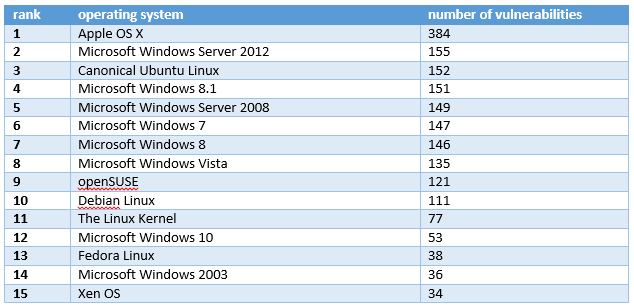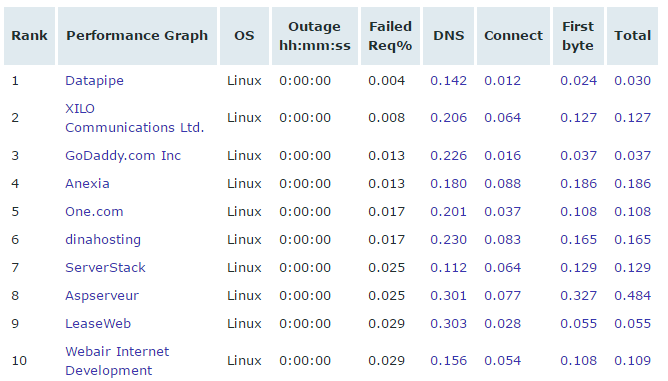In this article, I’ll describe my personal selection of the top three most important criteria for selecting a server operating system. I’ll compare two competing operating systems, Microsoft Windows Server and Linux (Unix based). Both of these OS’s are capable of functioning as a network server, but for this article, I’ll be referring to a server, whose primary function is that of a web server (a system that is designed to host the websites).
Comparison Criteria
Following are the three criteria that I consider essential when it comes to selecting the best operating system for a web server.
- Market Share
- Stability and Reliability
- Security
Let’s go over some of the motivations for the selection of criteria above.
Market Share
Nowadays, web servers are no longer the simple services capable of just displaying the textual content. The web server is an essential part of a technical stack and server architecture, fulfilling many critical roles. Amongst some of the essential functions of the Internet web server is its capability to serve the dynamic content of a web-based e-commerce application. “The e-commerce market is enormous, growing extremely fast, and showing no signs of slowing down. According to sources like eMarketer, e-commerce is the only trillion-dollar industry growing at a double-digit percentage each year.” Ecommerce (2014).
That said, operating system that provides the web server role should be capable of flawlessly executing most of the rich web applications available on the market, as well as a plethora of frameworks and front end programming languages.
One of the best indicators of which system is better suited for serving websites is the OS market share for web servers. Currently, the market share seems to favor Linux over Microsoft (Figure 1). W3Techs reports that as of August 2016, “Unix is used by 66.9% of all the websites whose operating system we know. Windows is on the other hand used by 33.1% of all the websites whose operating system we know.” (Q-Success, 2016).
Figure 1.
Source Date Unix**, **Unix-like Microsoft Windows
W3Techs Aug-15 66.9% 54.3% 1.1% 11.5% 33.1%
Some of the favorite sites using Windows are Live.com, Bing.com, Msn.com, Microsoft.com, Diply.com, Office.com, and Microsoftonline.com. As we can see, the most famous are owned by Microsoft, so it shouldn’t be a surprise that Microsoft is using their OS to run their web servers. However reliable these may be, these websites are visited by so many visitors that this on its own is probably skewing the usage stats and the actual market share is very likely even lower. Linux is the operating system which is installed on 66.9% of web servers is Unix. Out of that 54.3% share is taken by Linux systems. More specifically Ubuntu makes 33.9% of that share, followed by Debian at 31.5 and CentOS with 20.6%. Very popular websites such as Aol.com, Archive.org, Businessinsider.com, Gsmarena.com, Thesaurus.com or Wunderground.com are hosted on Linux. Based on this stats, we can safely say that most businesses choose Linux over Windows when it comes to hosting websites.
Stability and Reliability
As we see, market share is heavily on the side of Linux, but it’s hard to know the real motivations of each business or individual for selecting Linux over Windows. A properly functioning web server, which doesn’t experience any interruptions leading to loss of the profit, would probably be the most important factor for anyone thinking of selecting the best OS to host web server.
As per Kenneth Milberg of PowerTCO, “Windows works best in the desktop arena, while Linux is slowly pushing harder in that area. Unix still works best in mission-critical environments where one needs optimum reliability and scalability and vendor support. Linux is closing the gap on the desktop and server market, primarily because of its reliability, scalability, and quality.” (Milberg, 2004). A similar belief is further enforced by the appearance of many article headlines in the news. Just recently we’ve seen that “International Space Station switched from Windows to Linux, for improved reliability” (Anthony, 2013).
But how can we measure reliability? One of the best measures is the OS uptime. Netcraft is an Internet service company that provides web server analysis, including operating system detection. Netcraft's uptime list for May 2016 shows that the top 10 most reliable hosting companies were all using Linux as the choice of operating system (Figure 2).
Figure 2.

The high uptime trend for Linux based systems is due to Unix nature of working with the file system. Microsoft is using the concept of "in use" files, which means that libraries cannot be updated without a reboot. This is not the case for Unix based OS’s. In any case, Linux seems to have an upper hand here.
Security
One of the most important criteria for selecting the operating system is the security of operating system. And one of the most important measures of a secure system, is the total number of vulnerabilities reported for the operating system.
The report from The National Vulnerability Database (NVD) shows that as of 2014 (Figure 3), Microsoft 2003, 2008 and 2008 server operating systems were impacted by a combined total of 340 vulnerabilities. The Linux systems on the other hand (Ubuntu, openSuse, Debian, Fedora from top 15 list) had combined 422 different vulnerabilities.
So the Microsoft seems to have an upper hand here. Although to be entirely fair, if we compare the most popular Ubuntu Linux distro to that of most modern Microsoft Windows Server 2012 operating system, we’d see that they have an almost identical number of vulnerabilities reported.
Figure 3.

Conclusion
Market share is leaning heavily in favor of Linux. We see that for every Windows-based web server, there are two Linux web servers out there. When we review reliability stats for Linux and Windows, we see that the largest hosting provider websites are all powered by Linux; and experience the least number of outages. The only change I see is when it comes to OS security. It’s safe to say that Linux has a reputation for being secure, but perhaps this view may no longer be held by everyone. The most recent Windows Server 2008 and 2012 versions of OS appear to be on par with Linux and are increasingly more secure.
I have to conclude, that based on my Top 3 list of criteria for selection of operating system used for web hosting, Linux would still be my top choice of operating system.
References
OS Comparision (2016) ‘Comparison of operating systems’, in Wikipedia. Available at: https://en.wikipedia.org/wiki/Comparison_of_operating_systems (Accessed: 28 August 2016).
Red Hat (2013) ‘How red hat enterprise Linux trims total cost of ownership (TCO) in comparison to windows server’. Available at: https://www.redhat.com/en/about/blog/how-red-hat-enterprise-linux-trims-total-cost-of-ownership-in-comparison-to-windows-server (Accessed: 28 August 2016).
Ecommerce (2014) ‘How many Ecommerce companies are there? - the data point’. Available at: https://blog.rjmetrics.com/2014/06/18/how-many-ecommerce-companies-are-there/ (Accessed: 28 August 2016).
Q-Success (2016) Usage statistics and market share of operating systems for Websites, august 2016. Available at: https://w3techs.com/technologies/overview/operating_system/all (Accessed: 28 August 2016).
Milberg (2004) Which is better and more stable: Windows, Unix or Linux?. Available at: http://searchenterpriselinux.techtarget.com/answer/Which-is-better-and-more-stable-Windows-Unix-or-Linux (Accessed: 28 August 2016).
Anthony, S. (2013) International space station switches from windows to Linux, for improved reliability. Available at: http://www.extremetech.com/extreme/155392-international-space-station-switches-from-windows-to-linux-for-improved-reliability (Accessed: 28 August 2016).
Manes, C. (2016) Most vulnerable operating systems and applications in 2015. Available at: http://www.gfi.com/blog/2015s-mvps-the-most-vulnerable-players/ (Accessed: 28 August 2016).
Netcraft (2016) in Wikipedia. Available at: https://en.wikipedia.org/wiki/Netcraft (Accessed: 28 August 2016).